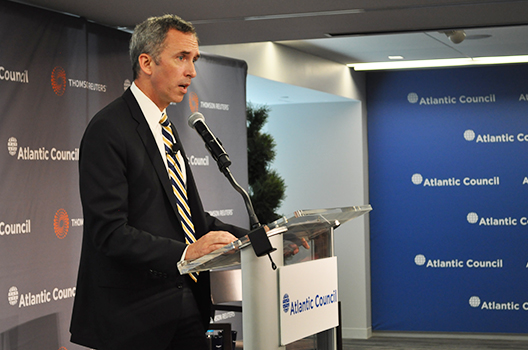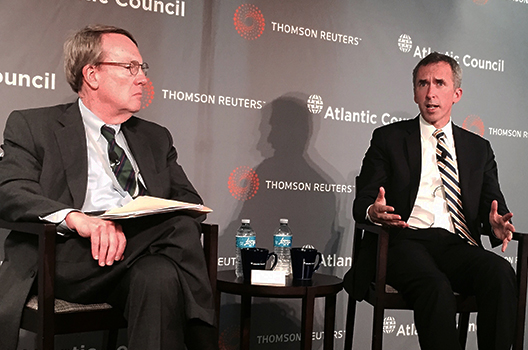 As part of the ‘Power of Transparency’ series, a speaker series co-hosted by the Atlantic Council and Thomson Reuters, the Atlantic Council hosted the Honorable Marcel Lettre, under secretary for defense in intelligence at the Department of Defense, on September 13 to talk about how transparency has transformed the intelligence community since 9/11.
As part of the ‘Power of Transparency’ series, a speaker series co-hosted by the Atlantic Council and Thomson Reuters, the Atlantic Council hosted the Honorable Marcel Lettre, under secretary for defense in intelligence at the Department of Defense, on September 13 to talk about how transparency has transformed the intelligence community since 9/11.
Daniel Y. Chiu, deputy director of the Atlantic Council’s Brent Scowcroft Center, and Timothy P. Murphy, president of Thomson Reuters Special Services, provided welcoming and introductory remarks, highlighting the importance of transparency for the intelligence sector. In his key note speech, Under Secretary Lettre addressed how transparency has been transformative in the field of intelligence and elaborated on the important role transparency has had in allowing the intelligence community to be far more effective in delivering value to intelligence consumers of all ranks. The foreign affairs and national security editor at Reuters News, Mr. John Walcott, moderated the ensuing discussion and Q&A portion of the event.

Reuters Foreign Affairs and National Security editor John Walcott and Undersecretary for defense in Intelligence at the Department of Defense Marcel Lettre discuss how transparency has transformed the intelligence community since 9/11.
Under Secretary Lettre’s speech centered around two major themes: transparency into intelligence and transparency within intelligence. Transparency into intelligence refers to the intelligence community’s more recent efforts of informing the public of their activities. These efforts are a response to the change in public expectations for transparency of operations in recent years, sparked by innovation in technology and the availability of information through mass media. Under Secretary Lettre does caution that the intelligence community cannot provide the public with all information, but will provide all details of the information it can share in order to build public trust in the intelligence community. Under Secretary Lettre attributes transparency within intelligence to both the improved integration among the various sections of the intelligence community to drive national security operations as well as the establishment of public/private relationships to accomplish missions.
Pre-9/11, there was little cohesion between the various parts of the intelligence community. Now, we can see the improved integration, for example, by the unity between the intelligence community and the military. Intelligence is essential for the military to make appropriate and informed decisions and their ability to deter adversaries. Likewise, supporting humanitarian relief efforts and safety of maritime and air navigation through capitalizing on open source data is evidence that public/private relationships benefit the intelligence community.
The Under Secretary stressed that the Department of Defense’s ability to adapt to future technological, organizational, and cultural changes will be decisive for the defense of the nation. In this light, his department will continue to operate with transparency, “openness to new ideas, new technologies, and new approaches.”
Image: Undersecretary for Defense in Intelligence at the Department of Defense Marcel Lettre gives his keynote speech at the Atlantic Council on Tuesday, September 13, 2016.
